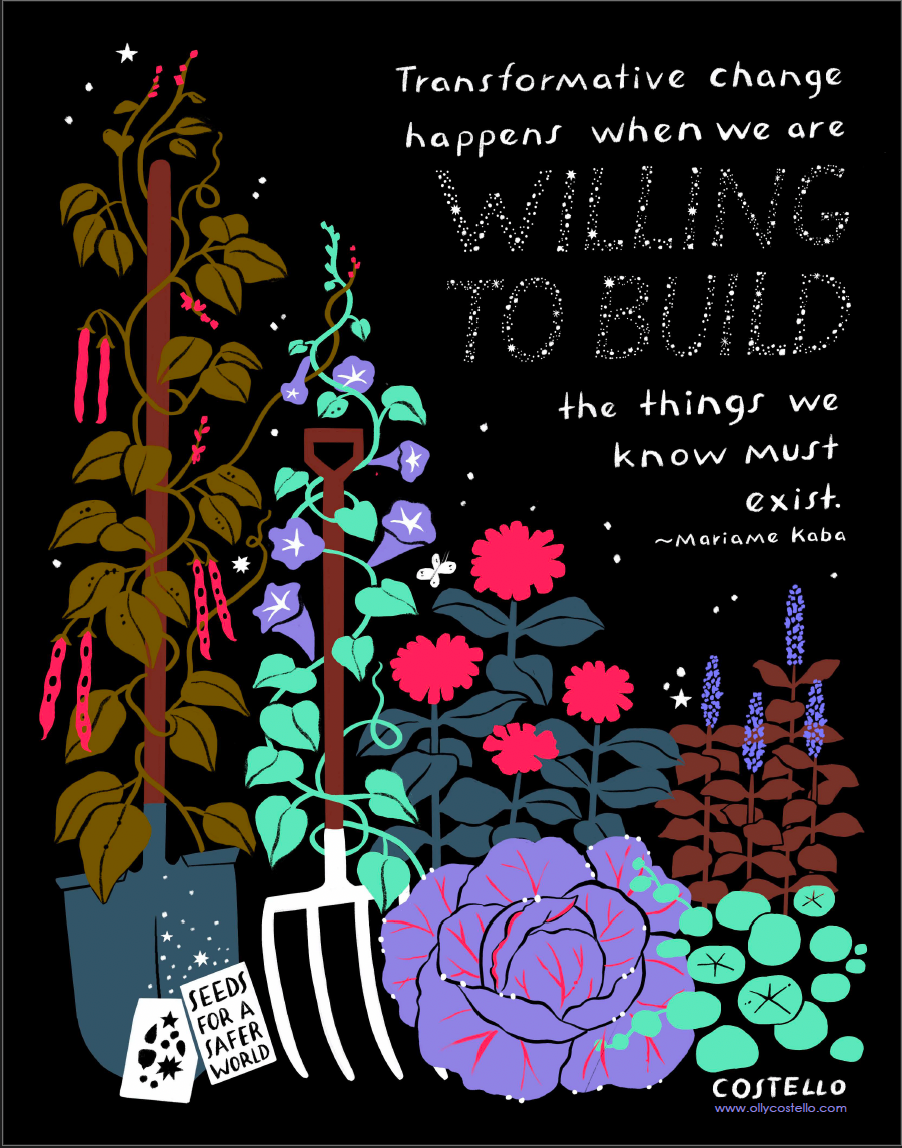
“In a fractal conception, I am a cell-sized unit of the human organism, and I have to use my life to leverage a shift in the system by how I am, as much as with the things I do. This means actually being in my life, and it means bringing my values into my daily decision making. Each day should be lived on purpose.”―adrienne maree brown, Emergent Strategy: Shaping Change, Changing Worlds
PREreview stands firm: equity, diversity, inclusion, and accessibility are not optional—they are essential to Open Science and human well-being. We reject any vision that excludes them.
Equity, diversity, inclusion, and accessibility values and practices are the center of our approach towards transforming systems in the context of scholarly peer review. They are the guiding principles that inform how we work at PREreview, how we imagine our future, and how we grow as individuals in the community. They are key to fulfilling our mission towards a liberated future in which knowledge flows freely and equitably, unbound by systemic barriers or entrenched hierarchies.
Beginning on January 20, the U.S. government has been issuing a flurry of executive orders that threaten the present and future of our communities in the U.S. and globally, that directly target individuals and groups who have already been facing violence and harm, that demolishes decades of work aiming at dismantling oppressive systems that dominate our societies, science, and scholarship.
These executive orders limit our ability to exist as people and as community members involved in the exchange of knowledge, including science and academia. As our colleagues at ASAPbio have shared in this message of support, thousands of National Institute of Health (NIH) scientists have already been forbidden from sharing their work as preprints. This is another example that very clearly states the intentions of this administration to censor information to increase control of what knowledge can and can’t be shared. These actions are not new. Scientific information has been curated to create barriers and legitimize oppression for centuries. It is unacceptable to see this happen again, so openly in the context of a nation that calls for freedom as the foundation of its democracy.
So what can we do?
We’re taking steps right now to show up in ways we can as PREreview.
We are looking into ways we can better support the review of datasets to add to the open, historical record of their existence; we are translating PREreview into new languages to open new avenues of accessibility for reviewers; and we are continuing to offer training that helps reviewers reflect on the impact of their beliefs and attitudes in the evaluations of scholarly work.
We stand in solidarity with colleagues and organizations who have already been impacted by the freeze of federal funding, the removal of funding streams related to diversity, and many other changes implemented to comply (or over-comply) with the recent executive orders. We are grateful for the leadership demonstrated by many organizations who are part of our extended community such as rOpenSci, ASAPbio, Invest in Open Infrastructure, and many others who have restated their commitment to their values and provided ways to connect, act, and share. We also invite all organizations in a position to do so to speak up, organize, share information, and help those who cannot but are nonetheless doing the work to resist.
We’ve compiled a list of curated articles that we hope will provide some guidance in these difficult times. We commit to updating this list weekly with additional resources. If you would like to add anything to this list, if you would like to talk further, if you want to share ways we can work together, or have any questions, please email us at community at prereview dot org.
Resources for and from our community:
Resources and Strategies
- Action Lab Living Database: https://airtable.com/apppMymixtqx3yqxa/shrpqNUa2cLF4gjwh
- Healing Through Action- Confronting Collective Trauma with Community Care: https://medium.com/healingequityunited/healing-through-action-confronting-collective-trauma-with-community-care-3c19c12428b5
- How to Not Obey in Advance: https://nonprofitquarterly.org/how-to-not-obey-in-advance-actions-for-resisting-authoritarianism/
- They Banned DEIB Words — We Code-Switch and Keep Going.: https://medium.com/healingequityunited/they-banned-deib-words-we-code-switch-and-keep-going-018f7cdd71ed
- A guide to using Signal for government workers: https://a.wholelottanothing.org/a-guide-to-using-signal-for-government-workers/
- The Data Liberation Project: https://www.data-liberation-project.org/
- A Pocket Guide for Scientists- Handling Political Harassment and Legal Intimidation: https://www.csldf.org/resource/pocket-guide-to-handling-political-harassment-and-legal-intimidation/
- A Pocket Guide for Scientists- Safeguarding Online Communications: https://www.csldf.org/resource/pocket-guide-to-safeguarding-online-communications/
- Speaking Up for Science: https://www.whistleblower.org/wp-content/uploads/2018/11/GAP_Federal-Employees-Whistleblower-Guide.pdf
- The Coalition for Diversity and Inclusion in Scholarly Communications (C4 DISC)- Toolkits for Equity: https://c4disc.org/toolkits-for-equity
- Bolder Advocacy– State Practical Guidance Resources:
https://afj.org/bolder-advocacy - Preparing for a Second Term by Learning from Hungary’s Playbook https://nonprofitquarterly.org/preparing-for-a-second-trump-term-by-learning-from-hungarys-playbook
Statements, Messages, and Calls to Action
- A Message of Support from ASAPbio: https://asapbio.org/a-message-of-support-from-asapbio
- Call to action- Protect vulnerable infrastructure and research independence: https://investinopen.org/blog/call-to-action-protect-vulnerable-infrastructure-and-research-independence
- DEIA and Doing the Right Thing: https://scholarlykitchen.sspnet.org/2025/02/11/deia-and-doing-the-right-thing
- Open Science and Open Source only with Diversity, Equity, Inclusion, and Accessibility: https://ropensci.org/blog/2025/02/05/no-science-without-deia
- An assault on science anywhere is an assault on science everywhere: https://www.nature.com/articles/d41586-025-00562-w
- Science is Under Siege- The Open Science Community Must Act and Lead by Example https://upstream.force11.org/open-science-call-to-act
- Save Science, Save Lives: https://www.ucs.org/take-action/save-science-save-lives
- The Carpentries' Reinforced Commitment: https://carpentries.org/blog/2025/03/the-carpentries-reinforced-commitment-to-inclusion-diversity-equity-and-accessibility/C
- The Future of Open Scholarship: https://www.cos.io/about/news/cos-statement-on-the-future-of-open-scholarship
- Science Under Threat in the U.S.: https://elifesciences.org/collections/939abdae/science-under-threat-in-the-us
- Reaffirming pyOpenSci’s Commitment to Inclusion: https://www.pyopensci.org/blog/pyopensci-commitment-inclusion.html
- Science Under Threat in the US: https://elifesciences.org/collections/939abdae/science-under-threat-in-the-us
Readings and More Information
- Project 2025, Explained: https://www.aclu.org/project-2025-explained
- NIH hit with ‘devastating’ freezes on meetings, travel, communications, and hiring: https://www.science.org/content/article/trump-hits-nih-devastating-freezes-meetings-travel-communications-and-hiring
- Some U.S. COVID-19 data are down amid “pause” to federal health communications: https://thesicktimes.org/2025/01/24/some-u-s-covid-19-data-are-down-amid-pause-to-federal-health-communications/